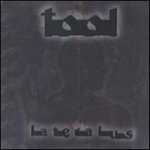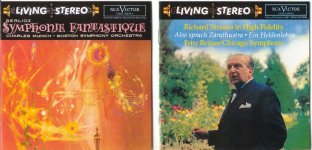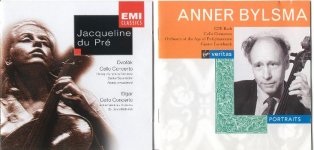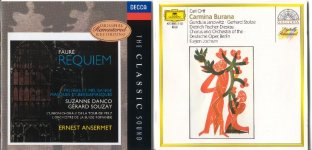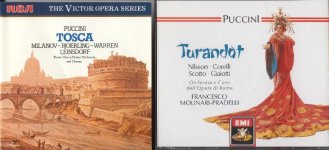slowmotion said:Hi all
I like tis one:
Madama Butterfly
I have the same "Butterfly" -- I think that any recording (or live performance for that matter) of Butterfly could be improved by cutting the final scene to 20 minutes.
Heartbeat DrumSong, From Robbie Robertson's Songs for the Native Americans. Track 4, (I think), Heartbeat Drum Song, although having slightly over produced vocals, has some really good accoustic percussion that really tests definition in a system.
It's also quite a good chill out track!
It's also quite a good chill out track!
Attachments
Tzadik Availability
Tzadik recordings (as well as a number of similarly adventurous recordings) are almost always available at Forced Exposure.
Cody
Tzadik recordings (as well as a number of similarly adventurous recordings) are almost always available at Forced Exposure.
Cody
Hi all,
For outright detail it would have to be almost anything by Massive Attack.
For overall system testing to get an idea of the general sound, I haven't found much better or more challenging than this...and it's an awesome album imo!!
Tool - Lateralus (also on HDCD the only one I own...)
the only one I own...)
Steve
For outright detail it would have to be almost anything by Massive Attack.
For overall system testing to get an idea of the general sound, I haven't found much better or more challenging than this...and it's an awesome album imo!!
Tool - Lateralus (also on HDCD
Steve
Attachments
Peter, this thread is a great idea.
I have bought "audiophile-rated" records long ago... Yes, very nice quality, but soooo uninvolving for me from the musical viewpoint... I struggled to listen to them, but finally gave up... Not my "Cup of tea", as we say here
So my turn ?
These are just records I love, both for the music on them and their quality....
For classical music, Vivaldi's Four Seasons by "The Connecticut Early Music Festival Ensemble", a Chesky Record, with ancient instruments. Very defined soundstage, and the small dissonances between lightly tuned-out instruments become clearly apparent on good systems.
For "modern" music I particularly love this one :
I particularly love this one :
(Yes, the brother )
)
Mostly an acoustic record, with a minimalist recording gear (as said in the liner notes). But geeeeee... What a sound, and a lot of air between the notes...
And for the "electronic/ambient/d&b" music, "Mo-di" by "Mouth Music" is my long time favourite. The dynamic range together with the level of details make me discover something new every time I listen to it. A must have, IMHO.
Just my 2c
I have bought "audiophile-rated" records long ago... Yes, very nice quality, but soooo uninvolving for me from the musical viewpoint... I struggled to listen to them, but finally gave up... Not my "Cup of tea", as we say here
So my turn ?
These are just records I love, both for the music on them and their quality....
For classical music, Vivaldi's Four Seasons by "The Connecticut Early Music Festival Ensemble", a Chesky Record, with ancient instruments. Very defined soundstage, and the small dissonances between lightly tuned-out instruments become clearly apparent on good systems.
An externally hosted image should be here but it was not working when we last tested it.
For "modern" music
An externally hosted image should be here but it was not working when we last tested it.
(Yes, the brother
Mostly an acoustic record, with a minimalist recording gear (as said in the liner notes). But geeeeee... What a sound, and a lot of air between the notes...
And for the "electronic/ambient/d&b" music, "Mo-di" by "Mouth Music" is my long time favourite. The dynamic range together with the level of details make me discover something new every time I listen to it. A must have, IMHO.
An externally hosted image should be here but it was not working when we last tested it.
Just my 2c
Re: Tori Amos
Audiophiles don't like synthesizers. But I like Scarlet Walk best, because all songs in the album is okay. But I don't use synthesizers for loudspeaker (or amp) testing. I use great music recordings, or a complex/difficult music recordings.
I haven't played Under The Pink on my current speaker, but I will be in a few hours.
moe29 said:just about any of Tori's recordings... but when i'm listening to a
new amp, preamp, or speakers i always seem to put this record
on first
Audiophiles don't like synthesizers. But I like Scarlet Walk best, because all songs in the album is okay. But I don't use synthesizers for loudspeaker (or amp) testing. I use great music recordings, or a complex/difficult music recordings.
I haven't played Under The Pink on my current speaker, but I will be in a few hours.
I am happy not to be an audiophile but a music lover
Impressive?? No!!!! Dissapointing? Yes (but not unexpectedly so).
Since I am an almost 100% classical listeners, your usual
recommendations do not interest me, and I wouldn't have
a clue about how to really judge sound quality on non-acoustical
music. When you suddenly recommended a classical recording I
got curious and for the price of a Naxos I thought it might be
worth finding out what you consider audiophile sound. Well, let's
say I am happy not to consider myself an audiophile. This
This
recording is not only a typical ordinary modern recording but
it is also a weird one. Why weird? Well, I reacted almost
immediately that something sounded strange. The cello is
rock steady in the middle, which is OK, but the piano is spread
out between the speakers with the high notes to the left and
the low notes to the right!!!! There is no chance in the world
that it could sound even remotely like that unless the cellist is
placed behind the pianist and I am facing the pianist and
leaning over the piano, or something like that. Compare, for
instance, with my favourite recording (musically) of the cello
sonatas, du Pré and Barenboim (EMI), where neither instrument
is spread out, the cello is slightly to the left, the piano slightly
to the right and the cello slightly in front of the piano, just as
is customary in concert. Apart from this strange phenomenon,
the sound is typical modern, or should I say post-modern since
we are past the worst days of early mixing-hysteria and early
digital sound. There is a lot of detail and resolution in the sound,
which we should expect with modern technology, but the sound
is manufactured and dry. There is barely any acoustics at all.
Neither is there much acoustics around each instrument and
nor is there any general acoustics. The instruments are like
in a vacuum, removed from any real hall acoustics, which is
typical of most modern recordings. However, the sounds is
still good enough not to get in the way of enjoying the music,
and I cannot say it is bad sound, just plain, ordinary, modern
sound. I'll post my own list of classical suggestions in a short
while (it will even include a modern Naxos!! ).
).
Please note, Peter, that I am not in any way complaining, just
commenting and giving my view. I took a calculated risk when
buying the CD on your recommendation and I was fully aware
of that. I wouldn't have done it with a full-price CD unless I
had had other reasons to believe it would be good.
Peter Daniel said:Being not a big fun of classical music, I found this recording quite impressive.
Impressive?? No!!!! Dissapointing? Yes (but not unexpectedly so).
Since I am an almost 100% classical listeners, your usual
recommendations do not interest me, and I wouldn't have
a clue about how to really judge sound quality on non-acoustical
music. When you suddenly recommended a classical recording I
got curious and for the price of a Naxos I thought it might be
worth finding out what you consider audiophile sound. Well, let's
say I am happy not to consider myself an audiophile.
recording is not only a typical ordinary modern recording but
it is also a weird one. Why weird? Well, I reacted almost
immediately that something sounded strange. The cello is
rock steady in the middle, which is OK, but the piano is spread
out between the speakers with the high notes to the left and
the low notes to the right!!!! There is no chance in the world
that it could sound even remotely like that unless the cellist is
placed behind the pianist and I am facing the pianist and
leaning over the piano, or something like that. Compare, for
instance, with my favourite recording (musically) of the cello
sonatas, du Pré and Barenboim (EMI), where neither instrument
is spread out, the cello is slightly to the left, the piano slightly
to the right and the cello slightly in front of the piano, just as
is customary in concert. Apart from this strange phenomenon,
the sound is typical modern, or should I say post-modern since
we are past the worst days of early mixing-hysteria and early
digital sound. There is a lot of detail and resolution in the sound,
which we should expect with modern technology, but the sound
is manufactured and dry. There is barely any acoustics at all.
Neither is there much acoustics around each instrument and
nor is there any general acoustics. The instruments are like
in a vacuum, removed from any real hall acoustics, which is
typical of most modern recordings. However, the sounds is
still good enough not to get in the way of enjoying the music,
and I cannot say it is bad sound, just plain, ordinary, modern
sound. I'll post my own list of classical suggestions in a short
while (it will even include a modern Naxos!!
Please note, Peter, that I am not in any way complaining, just
commenting and giving my view. I took a calculated risk when
buying the CD on your recommendation and I was fully aware
of that. I wouldn't have done it with a full-price CD unless I
had had other reasons to believe it would be good.
slowmotion said:Hi all
I like tis one:
Madama Butterfly
You managed to find one of the few decent post-1970
recordings from DG. While looking through my shelves to
figure out what to recommend, I realize I had some excerpts
from Sinopolis Butterfly on an old sampler CD. It is surprisingly
good for a DG, and I think it is recorded at about the same
time as his Manon Lescaut, which I remember to have a
similar sound (don't have it myself). However, in my opinion
we can do better than that (I'll give some suggestions soon).
The DG is a decent opera recording, but not a really good one
(if there are any such at all).
Hey Christer, I can send you a refund of a full price.
Not being a classical music fan, maybe that's why I liked this recording. I have all 3 Stereophile Test CDs, and for some reason I can't listen to any of them and I don't find them interestng. Maybe because they are recorded in a way the classical should be recorded? I don't know.
On Naxos disc, cello was what impressed me most, I'm not a piano fan either. Please note that I did not comment on the quality of that recording, as I have no clue how classical should be recorded. All I said, I was impressed by the strange sounds I'm normally used to. This is not my regular audiophile material though.
Not being a classical music fan, maybe that's why I liked this recording. I have all 3 Stereophile Test CDs, and for some reason I can't listen to any of them and I don't find them interestng. Maybe because they are recorded in a way the classical should be recorded? I don't know.
On Naxos disc, cello was what impressed me most, I'm not a piano fan either. Please note that I did not comment on the quality of that recording, as I have no clue how classical should be recorded. All I said, I was impressed by the strange sounds I'm normally used to. This is not my regular audiophile material though.
Having just commented on some other peoples classical suggestions,
I will give a few suggestions of recordings (CD only) that I consider
among the best I have heard. As you have probably figured out,
I don't fancy the typical modern sound that seems manufactured,
and doesn't give any feeling of being there. I decided, however,
not to loose readers already here by suggesting any mono or
prewar recordings, so let's start about a decade into the era
of stereo tape recorders, 1954.
These two CDs are both from RCAs first year of stereo experiments
with their own proprietary tape recorders. I think I have never
had such a feeling of being in the concert hall as when listening
to these recordings. The Berlioz is, I think, recorded somewhat
earlier and has a little bit more problem with noise and distorsion,
but the 4th and 5th movements are definitely worth listeining to
since they exhibit quite an array of difficult instruments. Seldom
or never have brass and bass drum sounded as good and real
as on these recordings, and listen to the bells (or what they
are called) in the 5th movement of Berlioz!!
I will give a few suggestions of recordings (CD only) that I consider
among the best I have heard. As you have probably figured out,
I don't fancy the typical modern sound that seems manufactured,
and doesn't give any feeling of being there. I decided, however,
not to loose readers already here by suggesting any mono or
prewar recordings, so let's start about a decade into the era
of stereo tape recorders, 1954.
These two CDs are both from RCAs first year of stereo experiments
with their own proprietary tape recorders. I think I have never
had such a feeling of being in the concert hall as when listening
to these recordings. The Berlioz is, I think, recorded somewhat
earlier and has a little bit more problem with noise and distorsion,
but the 4th and 5th movements are definitely worth listeining to
since they exhibit quite an array of difficult instruments. Seldom
or never have brass and bass drum sounded as good and real
as on these recordings, and listen to the bells (or what they
are called) in the 5th movement of Berlioz!!
Attachments
Hm, I thought I had seen people attach multiple images, but it
didn't work the obvious way, so I have to split it up.
We move on to du Prés recordings of Elgar (1965) and
Dvorak (1971). It doesn't quite have the acoustics and
presence of the RCA recordings, but still there is quite a
lot of sounding as in the hall, and we have still have a
warm sound with somewhat more resolution and detail
(I think).
For those of you who insist on something more modern,
let's suggest the Virgin Veritas recording with Bylsma. It
is not at all like the previous ones, but tends towards a
believable acoustic and is somwhat warmer and less dry
than most other modern recordings.
didn't work the obvious way, so I have to split it up.
We move on to du Prés recordings of Elgar (1965) and
Dvorak (1971). It doesn't quite have the acoustics and
presence of the RCA recordings, but still there is quite a
lot of sounding as in the hall, and we have still have a
warm sound with somewhat more resolution and detail
(I think).
For those of you who insist on something more modern,
let's suggest the Virgin Veritas recording with Bylsma. It
is not at all like the previous ones, but tends towards a
believable acoustic and is somwhat warmer and less dry
than most other modern recordings.
Attachments
Re: Christer
Sorry, had to edit and then delete, since I made a failed
attempt at attaching multiple images.
Nickolas K. said:Where is the image???
Sorry, had to edit and then delete, since I made a failed
attempt at attaching multiple images.
Enter the human voice. I find the 1955 Decca recording of Fauré
very good, especially the choir. In addition to that, it was the
first, and probably still is one of the few, intepretations of the
work that has made any sense to me. Although I usually
dislike modern DG recordings more than modern recordings
in genereal, the Orff is old enough (1968) that DG still knew
how to make recordings. Beware however. The version shown
here is probably not available except in second hand shops, and
DG has had a tragic tendency to make every new remastering
sound worse than the previous one, so more modern versions
of it may be less satisfactory than this Galleria issue.
very good, especially the choir. In addition to that, it was the
first, and probably still is one of the few, intepretations of the
work that has made any sense to me. Although I usually
dislike modern DG recordings more than modern recordings
in genereal, the Orff is old enough (1968) that DG still knew
how to make recordings. Beware however. The version shown
here is probably not available except in second hand shops, and
DG has had a tragic tendency to make every new remastering
sound worse than the previous one, so more modern versions
of it may be less satisfactory than this Galleria issue.
Attachments
Christer,
Since you mention that you are going to post some of your classical music suggestion, could you post (in fact recommend) some classical music that has fast, heavy bass notes? In another word, I would term it "aggressive-very-involving" music for the following category:
1) Solo Piano
2) Solo Cello
3) Piano & Cello
4) Full Orchestra
First preference - SACD (& of course with musical instruments placement recorded correctly)
Second preference - regular CD (not necessary audiophile qrade)
Thanks.
P.S.
If you are not sure of what I'm talking about, that's o.k. .... I ask the same questions to the folks working at the classical section of Tower Records and he basically gave me a blank stare look.
Since you mention that you are going to post some of your classical music suggestion, could you post (in fact recommend) some classical music that has fast, heavy bass notes? In another word, I would term it "aggressive-very-involving" music for the following category:
1) Solo Piano
2) Solo Cello
3) Piano & Cello
4) Full Orchestra
First preference - SACD (& of course with musical instruments placement recorded correctly)
Second preference - regular CD (not necessary audiophile qrade)
Thanks.
P.S.
If you are not sure of what I'm talking about, that's o.k. .... I ask the same questions to the folks working at the classical section of Tower Records and he basically gave me a blank stare look.
And finally, the most difficult to find good recordings in, both
technically and musically, that is, opera. Since I tend to go
further back in time more often with opera than with orcehstral
music, for musical reasons, I tend to have even more prewar
recordings and even less 1950 and onwards recordings of
opera. However, these two are quite good I think. There isn't
quite the same homogeneous acoustics on this RCA as on
the previous orchestral recordings, but I still find it impressive.
This Tosca has been reissued as RCA Living Stereo, which is
probably in even better sound than the issue I have (shown
below). The recording was made in 1957, but seems not to
have been released until 1964. The EMI is from 1966, when
EMI still knew how to do things.
technically and musically, that is, opera. Since I tend to go
further back in time more often with opera than with orcehstral
music, for musical reasons, I tend to have even more prewar
recordings and even less 1950 and onwards recordings of
opera. However, these two are quite good I think. There isn't
quite the same homogeneous acoustics on this RCA as on
the previous orchestral recordings, but I still find it impressive.
This Tosca has been reissued as RCA Living Stereo, which is
probably in even better sound than the issue I have (shown
below). The recording was made in 1957, but seems not to
have been released until 1964. The EMI is from 1966, when
EMI still knew how to do things.
Attachments
Christer
In the list you posted in the thread "Great Vocalist" please allow me to add:
Apollo Granforte, Karl Erb, Heinrich Schlusnus, Irene Minghini Cattaneo, Erna Berger, Maria Reining, Leonie Rysanek, Ferdinand Frantz, Josef Metternich, Rudolf Schock, Benno Kusche, Johanna Blatter, Lisa Otto, Sieglinde Wagner, Birgit Nilsson, Josef Greindl, Annelies Kupper, Wolfgang Windgassen, Ernst Haeflinger, Fritz Wunderlich, Beniamini Gigli, Maria Caniglia,.............. this list could be very vast.
Reiner's performance of Also sprach Zarathustra is one of the finest and the specific recording is the finest indeed.
But my favourite performance is that of Dimitri Mitropoulos with the Concertgebouw in 1958 in Salzburg (Originalaufnahme des Oesterreichischen Rundfunks - Grosses Festspielhaus 10. August 1958 - Herausgegeben von den Salzburger Festspielen).
If you are well aquainted with the work, I think it's worth buying the CD, Orfeo C 458 971 B, and you will be rewarded with one of the finest ever performances of Brahms' Symphonie Nr. 3 as well.
My favourite Symphonie Fantastique is that of Igor Markevitch and my favourite cellist is Gregor Piatigorsky but unfortunately he is not available in NAXOS.

Nick
In the list you posted in the thread "Great Vocalist" please allow me to add:
Apollo Granforte, Karl Erb, Heinrich Schlusnus, Irene Minghini Cattaneo, Erna Berger, Maria Reining, Leonie Rysanek, Ferdinand Frantz, Josef Metternich, Rudolf Schock, Benno Kusche, Johanna Blatter, Lisa Otto, Sieglinde Wagner, Birgit Nilsson, Josef Greindl, Annelies Kupper, Wolfgang Windgassen, Ernst Haeflinger, Fritz Wunderlich, Beniamini Gigli, Maria Caniglia,.............. this list could be very vast.
Reiner's performance of Also sprach Zarathustra is one of the finest and the specific recording is the finest indeed.
But my favourite performance is that of Dimitri Mitropoulos with the Concertgebouw in 1958 in Salzburg (Originalaufnahme des Oesterreichischen Rundfunks - Grosses Festspielhaus 10. August 1958 - Herausgegeben von den Salzburger Festspielen).
If you are well aquainted with the work, I think it's worth buying the CD, Orfeo C 458 971 B, and you will be rewarded with one of the finest ever performances of Brahms' Symphonie Nr. 3 as well.
My favourite Symphonie Fantastique is that of Igor Markevitch and my favourite cellist is Gregor Piatigorsky but unfortunately he is not available in NAXOS.
Nick
- Home
- General Interest
- Music
- Great audiophile recordings/albums
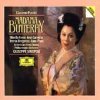

![music_for_the_native_americans_shadow[1].jpeg](/community/data/attachments/0/723-7743e09a7499f080fb4ba3df28e855f2.jpg)
